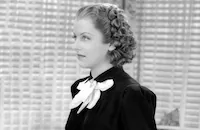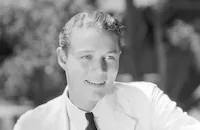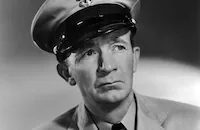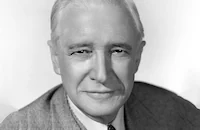A Wicked Woman

Brief Synopsis
Cast & Crew
Charles Brabin
Mady Christians
Jean Parker
Charles Bickford
Betty Furness
William Henry
Film Details
Technical Specs

Synopsis
When her abusive, rum-running husband Ed storms into their Louisiana bayou shack one night, hotly pursued by the sheriff, pregnant Naomi Trice refuses to allow him to flee with their son Curtis. Determined to take Curtis, Ed knocks Naomi to the floor and tries to force his way to the boy's bed, but is shot and killed by Naomi. After dumping Ed's body in the swamp, Naomi gives birth to a boy, Neddie, whose leg is misshapen because of Ed's abuse. The sheriff, whom Ed had shot while escaping, questions Naomi about her husband, but she refuses to reveal her deed. Later, she makes a pledge to God that if she is allowed to rear all of her children--Curtis, Yancey, Roseanne and Neddie--safely into adulthood, she will give herself up and pay the consequences of her crime. Naomi then moves her family away from the swamp and the still suspicious sheriff, changes her name to Stroud and eventually settles in a small Northern town. Over the next ten years, she relentlessly teaches her children, who, she believes, know nothing of their father's demise, to be strong, hard-working and frugal, while she herself slaves to make ends meet as a seamstress. Naomi's single-minded determination, however, jeopardizes her relationship with the rebellious Roseanne, who is especially resentful of her mother's stern attitudes toward play and leisure. Even as her financial situation greatly improves, Naomi refuses to relax her maternal watchfulness, fearful that if she does, her nearly grown children will fall prey to their weaknesses and suffer the consequences as she did. Curtis' employer, Pat Naylor, the publisher of the local newspaper, however, pursues a romance with Naomi and gently encourages her to let go of her children and enjoy herself. Naomi at first resists Pat's advice, but when she finally realizes that she is deeply in love with him, she agrees to marriage. Before she can announce her engagement, however, she discovers that Roseanne has snuck out of the house to see Bill Renton, a man she disapproves of, and later confronts her about him. Fed up with her mother's domination, Roseanne denounces Naomi and runs off to Bill's apartment. After the womanizing Bill coldly rejects Roseanne, Curtis bursts into the apartment and, while fighting with Bill, falls down a set of stairs. As Curtis fights for his life in a hospital, Roseanne and Naomi tearfully reconcile, and Naomi asks God to spare her child in exchange for her belated confession. After Curtis recovers, Naomi tells Pat and her children that she must return to Louisiana, but withholds the true purpose of her trip. During her trial, Naomi pleads her innocence, but refuses to involve her children, whose testimony the judge believes is crucial to her case. To her surprise, however, Pat and her children burst into the court, and Curtis reveals on the witness stand that he saw his mother kill his father to protect him. Finally free from her past, Naomi marries the devoted Pat.

Director
Charles Brabin
Cast

Mady Christians

Jean Parker

Charles Bickford

Betty Furness

William Henry
Jackie Searle
Betty Jane Graham
Marilyn Harris

Paul Harvey
Zelda Sears

Robert Taylor

Sterling Holloway
George Billings

Dewitt Jennings
Helene Chadwick
Charles Dunbar
Maidena Armstrong

Bonita Granville
Billy Sorenson

Edward Norris
Valerie De Lorenzo
Oscar Apfel
Robert E. O'connor

Walter Brennan
James P. Burtis
Donald Kerr
Gladden James

Samuel S. Hinds

Charles Levison
Purnell Pratt
Antonio Vidal
Connie Lamont
Miami Alvarez
Mathilde Comont
Roger Gray
Jack Curtis
Edwin J. Brady
Wesley Giraud
Lillian Elliott
Crew
Dr. William Axt
Cedric Gibbons
Burton Lane
Ben Lewis
Harry Rapf
Florence Ryerson
Zelda Sears
Douglas Shearer
Al Shenberg
Dolly Tree
Maurine Watkins
Lester White
Edwin B. Willis
Joseph Wright

Film Details
Technical Specs

Articles
A Wicked Woman
Of course, the film was hardly designed as a showcase for Taylor. That would have to wait. In the meantime, he was providing background for a story devoted to a timeless Hollywood staple -- mother love. Anne Austin's 1933 novel had captured readers with its story of a woman who kills her brutish husband in self-defense then moves to another city to raise her children under a new name. Only after they have grown does she return home to face punishment for her crime. Filled with the maternal sacrifice that had made hits of Stella Dallas (1925), The Sin of Madelon Claudet (1931) and the often-filmed Madame X (1916, 1920 and 1929), A Wicked Woman was a natural for the screen. MGM bought the property and announced it as a vehicle for Helen Hayes (who won the Best Actress Oscar® for Madelon Claudet) with first William K. Howard and then Clarence Brown assigned to direct. Instead, it marked the U.S. talking film debut of Mady Christians, one of the great stars of the European stage and screen.
Christians was born in Austria but emigrated to the U.S. with her actor parents at an early age. She made her stage debut with her father's theatre company and even made a silent film under the name Margarete Christians. But with World War I heating up in Europe there wasn't much of a market for German-accented performers here, so she returned to Europe, where she studied with Max Reinhardt and gradually built a starring career on stage and screen, primarily in Germany. In the early '30s, she fled Hitler's persecution of artists and wound up back in the U.S., where she did some stage work before moving to MGM, debuting there with her starring role in A Wicked Woman.
MGM eventually assigned Englishman Charles Brabin to direct. One of the great directors of the silent era, he had married one of his most popular leading ladies, Theda Bara. His prestige as a director of quality films had won him the assignment to direct Ben-Hur (1925), but when the production bogged down during location shooting in Italy, the studio replaced him. He then sued for breach of contract, but despite that, MGM ended up signing him to a long-term contract in 1930. Then the studio removed him from another high-profile film, Rasputin and the Empress (1932), the only film starring all three Barrymore siblings. He would retire from the screen after directing A Wicked Woman.
Taylor wasn't the only actor with a future cast in A Wicked Woman. His fiancée was played by MGM starlet Jean Parker, who enjoyed a few years of popularity at MGM before become the queen of the Bs in the '40s. Christians' romantic interest was Charles Bickford, a rugged leading man at the time who would become one of the screen's most popular character actors in films such as The Song of Bernadette (1943) and Johnny Belinda (1948). As one of Christians' children, you may notice the young Betty Furness, years before she became one of television's first celebrity pitchwomen.
A Wicked Woman won solid reviews, particularly for Christians. Although Andre Sennwald in The New York Times dismissed the plot as "a burlesque of all the maternal dramas ever visited upon an unhappy public," he hailed Christians for "[wading] into this ponderous drama with such genuine sincerity and skill that it becomes not only credible, which is a feat in itself, but impressive and considerably touching as well." That wasn't enough to convince MGM that she should be their next big star. For her second film at the studio, Escapade (1935), she moved into a supporting role while another European actress, Luise Rainer, rose to stardom. Christians would eventually return to the stage, where she scored successes as Gertrude to Maurice Evans' Hamlet and the star of Lillian Hellman's Watch on the Rhine. Then she recognized the stage potential of Kathryn Forbes' stories of an immigrant family in San Francisco and convinced Richard Rogers to star her in the stage version, I Remember Mama, written by her friend John Van Druten. She continued to play supporting roles in films, but after appearances in All My Sons and Letter from an Unknown Woman (both 1948), she was blacklisted because of her early involvement in anti-Fascist organizations and her continued union activities. She died in 1952 at the still young age of 57.
Despite his relatively small role and 11th billing, Taylor was just a few films away from stardom. He would follow A Wicked Woman with his role in the MGM short Buried Loot (1935), which launched the studio's award-winning Crime Does Not Pay series of shorts and piqued interest in his star potential in the front office. Ironically, the year before Christians made her last film appearance, Taylor named names at the first House UnAmerican Activities Committee hearings. A staunch conservative, he would be one of Hollywood's most fervent supporters of the blacklist.
Producer: Harry Rapf
Director: Charles Brabin
Screenplay: Florence Ryerson, Zelda Sears
Based on the novel by Anne Austin
Cinematography: Lester White
Art Direction: Cedric Gibbons
Music: William Axt
Cast: Mady Christians (Naomi Trice), Jean Parker (Rosanne Trice), Charles Bickford (Pat Naylor), Betty Furness (Yancey Trice), Jackie Searl (Curtis as a Boy), Paul Harvey (Ed Trice), Zelda Sears (Gram Teague), Robert Taylor (Bill Renton), Sterling Holloway (Peter Wells), Charles Lane (Defense Attorney Beardsley).
BW-73m.
by Frank Miller

A Wicked Woman
Quotes
Trivia
Notes
Although reviews claim that Mady Christians, a well-known German stage and screen actress who had worked at Ufa's Berlin studios, made her American screen debut in A Wicked Woman, modern biographical sources note that Christians actually had starred in a 1916 American film, Audrey, under the name Margarete Christians (see AFI Catalog of Feature Films, 1911-20; F1.0179). Christians moved to the United States in 1933 to escape persecution by the Nazis. Her most celebrated role was as the title character in the 1944 Broadway play I Remember Mama. Shortly before her death in 1951, Christians was blacklisted by the Hollywood community for her reputed involvement with the Communist party.
A Wicked Woman was screenwriter and actress Zelda Sears's last film. She died on February 19, 1935. According to a Hollywood Reporter news item, Sears, who occasionally appeared in pictures she scripted, had been reluctant to act in this film. Early pre-production Hollywood Reporter news items announced first that William K. Howard was to direct Helen Hayes in the film, and then that Clarence Brown was to direct Hayes and Lee Tracy. None of these directors or actors worked on the production, however. A Hollywood Reporter pre-production news item announced that Erskine Caldwell was assigned to write dialogue for the film, but his contribution to the final film has not been determined. Hollywood Reporter production charts add Benny Baker and Joe Twerp to the cast, but their participation in the final film has not been determined. Although Hollywood Reporter news items announced that Christians was to sing "In the Hash," a "novelty song" by Burton Lane, as well as "Swing Low, Sweet Chariot," the only song actually performed in the movie was Lane's "In Louisiana," which was sung by an all-black group.















